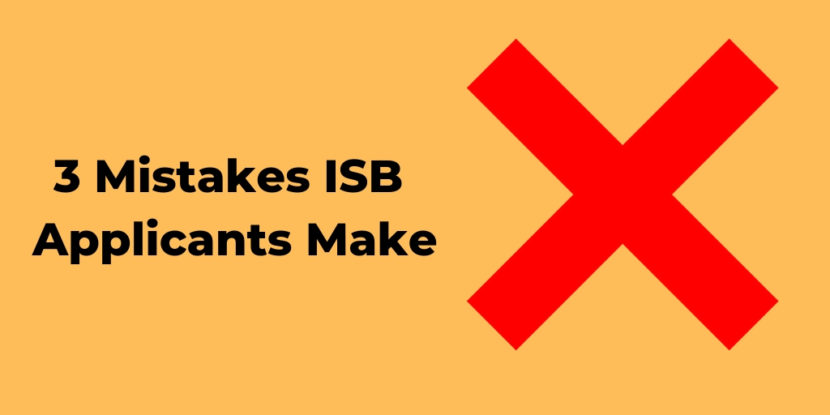When it comes to ISB (and more generally MBA) admissions, getting an interview short-list is only the first step. While there is no guaranteed formula to convert an interview call into an admit, there are a few things that are guaranteed to not get you the admit.
In this post, I want to elaborate on 3 common mistakes I’ve observed aspirants make during the interview.
1. Under Preparation:
Take it for granted that the interview panel has already read your application pack and is therefore interested to know more about you. So even if the question is the same as what is asked in the essays, be prepared to go in-depth in terms of the hows and the whys. Don’t merely repeat your essay. Given the word limits, it is hard to get into any depth in the written essay and the interview is a medium to get into the nitty gritty.
For example, if you have written that you want to get into consulting, be prepared with an understanding of the consulting industry, major companies and the kind of work they do, where in the hierarchy do you see yourself immediately and 3-5 years post MBA, what skills are needed to get into consulting, and how will you utilize the one year at ISB to gain those skills.
2. Unrealistic Goals:
Most B-schools like go-getters and those with a can-do attitude. However, there is a difference between setting aspirational, yet realistic, goals and lofty goals that will remain out of reach. Be it in terms of 3-5-10 year post-MBA career goals or what you will do while at the school, ensure that your goals are SMART (specific, measurable, achievable, realistic, timely) and tie-in with your strengths and past experience / credentials.
If you have never been in the top 10% of your class and have a GMAT score of 660, it is unlikely (although not impossible) that you will be in the top 10 at ISB and be the most sought after student by companies. Similarly, if you say you want to change the world and make a big social impact in 3 years post-MBA, what are the chances of that happening given that you will have to service student loans immediately after MBA?
3. Lack of Demonstrated Interest in the School:
At the end of the interview, most panels will give you the opportunity to ask questions. Do not say “I have none”. Ask genuine questions that demonstrate interest in the school, and tie-in with what you bring to the table and what you expect from the school. The difference between a good question and a bad / poor one is that a good question is reasonably specific and personalized such that the answer helps you evaluate whether the school fits you (the overall admissions process will decide whether you fit the school).
For example, asking how someone with your kind of a career background made an industry shift (if that’s what you are interested in doing) using the resources at the school would be a good question. Poor questions are extremely general and serve no purpose. Examples include asking the interview panel for their experience while at the school or information already available through the website and / or roadshows.
In my experience, even candidates who are good (and whose profiles are extremely interesting going by their applications) tend to sometimes make these mistakes. These mistakes are secular in the sense that I’ve seen them committed by aspirants from various backgrounds, both genders, and at various stages of their career. The fact that you have been shortlisted for an interview means that the school is serious in considering your application for admission. Do make use of that opportunity and avoid these mistakes that have cost many an aspirant.
Want to know more about ISB? Check out the ISB info page.
Want to know if you can get into ISB? Let us help you!
[button href=”http://applications.crackverbal.com/free-profile-evaluation/” style=”emboss” size=”medium” textcolor=”#ffffff”]Get your Profile Evaluated![/button]

